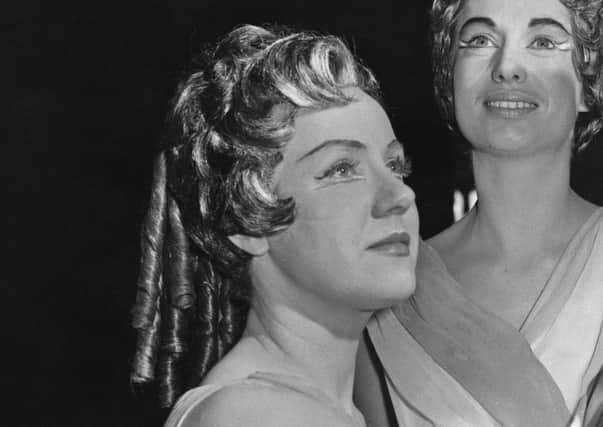Obituary: Elsie Morison, operatic soprano


The soprano Elsie Morison was a leading soprano in the early days of the Covent Garden Opera Company (later the Royal Opera). She came to London to London from Australia (the same year as Joan Sutherland) to try her luck as a professional singer in both the concert hall and opera house. She established herself as a major presence and became an integral member of the opera scene in the capital.
Morison had an engaging personality and was much respected for her warmth as a colleague, her musicality and her ability to capture the very essence of a character.
Advertisement
Hide AdAdvertisement
Hide AdOne former colleague at Covent Garden told me yesterday, “Everyone loved our Elsie. Her voice was like her character – just lovely. Even the hard-bitten members of the chorus never had a bad word to say about her.”
Her career was shortened after she married the famous Czech conductor Rafael Kubelík in 1963. The couple were devoted and Morison decided she would prefer to follow his career and travel with him.
Morison often returned to the land of her forebears and sang numerous concerts with the Scottish National Orchestra conducted by Walter Susskind and Karl Rankl. In 1954 she sang the Mass in C by Julius Harrison – a large work for orchestra, choir, soloists and organ – and returned in 1959 for both the Brahms’ Requiem Mass and The Messiah. Her final appearance with the SNO was in 1962 again for the Brahms’ Requiem.
Morison appeared in a historic production at the 1953 Edinburgh Festival. Glyndebourne gave the British premiere of Stravinsky’s The Rake’s Progress in a production by Carl Ebert. Morison sang Anne Trulove and the cast also included Sena Jurinac. The Scotsman critic gave the opera a rave review, “the production and singers represented Glyndebourne at its very best…I salute the singers led by Elsie Morison”.
In 1966 she sang Mahler’s mighty 4th Symphony with the New Philharmonia Orchestra under Kubelík.
Elsie Jean Morison’s family was descended from Scottish immigrants: her father died when she was a toddler and she was brought up by her mother who gave private singing lessons. Morison won various singing prizes and a visiting professor arranged for her to travel to London and have lessons at the Royal College of Music.
Morison then sang various roles with the Sadler’s Wells Company before making her debut (in 1954) at Covent Garden as Marzelline in Beethoven’s Fidelio under Clemens Krauss. Later that year Morison sang Antonia in a new production of The Tales of Hoffmann under Edward Downes and was a thrilling Mimi in La Boheme under Reginald Goodall.
That was followed by a delightful account of Marenka in a new production of Smetana’s The Bartered Bride under Kubelík: then musical director of the company. The original audition had not gone well for Morison – she blamed it on returning from a concert in Edinburgh and the train was delayed. Kubelík certainly did not consider Morison for the role. But the canny Sir David Webster, then general manager of Covent Garden, asked that she be heard again. He flew Morison out to Amsterdam where Kubelík was conducting and he auditioned her in the Concertgebouw. He was enchanted (and, indeed, soon married her) and immediately sent a telegram to Sir David, “We have our Marenka.”
Advertisement
Hide AdAdvertisement
Hide AdShe had a major success in the role and there followed her charming Susanna in the 1956 Marriage of Figaro under John Pritchard where her spritely Susanna was well matched by Geraint Evans’s finely sung Figaro. After the British premiere of Poulenc’s Dialogue des Carmelites in 1958 under Kubelík with Joan Sutherland in the cast Morison, prepared for a daunting challenge.
Her final appearance at Covent Garden was as Marzelline in the new and historic Otto Klemperer production of Fidelio with Klemperer conducting: the famous cast also included Sena Urinac, Hans Hotter and Jon Vickers.
Morison was much in demand as a recording artist. She made important discs of the Mozart Requiem with Sir Thomas Beecham, The Messiah under Sir Malcolm Sargent, Tippett’s Child of Our Time under Sir John Pritchard and The Mikado under Sargent where Morison was a delightful Yum-Yum.
The Kubelíks made their home principally in Switzerland but they were active in helping fellow Czechs during the uprising in 1968. They organised an international boycott of Czech artists against the Soviet invasion and provided support and comfort for many in the West. In 1990 despite ill health Kubelík returned to Prague to conduct the Czech Philharmonic at the Prague Spring Festival. After Kubelík had conducted an emotional account of Smetena’s Ma Vlast the Kubelíks were in tears.
Morison’s first marriage was dissolved and she married Kubelík in 1963 and she retired from singing. He died in 1996.